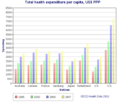Universal health care facts for kids
Universal health care, also called universal health coverage, means that everyone in a country can get the health care they need without worrying too much about money. It's a system where all citizens have access to medical services and are protected from very high costs.
Contents
What is Universal Health Care?
Universal health care is a way for a country to make sure all its people can get medical help. This includes things like seeing a doctor, getting medicines, or even having surgery. The main idea is that nobody should go without care just because they can't afford it.
How Does It Work?
There are different ways countries set up universal health care. Often, the government plays a big role. They might collect money through taxes to pay for health services. This way, everyone contributes, and everyone can use the services when they need them.
Different Models of Care
Some countries, like the United Kingdom, have a system where the government owns most hospitals and hires the doctors. This is often called a national health service. Other countries, like Germany or Japan, use a system where people pay into special insurance funds. These funds then pay for their medical bills. Even in these systems, the government often sets rules and helps make sure everyone is covered.
Who Pays for It?
Most universal health care systems are paid for in one of two main ways:
- Taxes: Money collected from people's paychecks or other taxes goes into a big pot. This pot then pays for hospitals, doctors, and medicines for everyone.
- Insurance: People pay regular amounts (called premiums) to an insurance company or a special fund. This fund then covers their medical costs. Sometimes, the government helps people who can't afford these payments.
Why is Universal Health Care Important?
Having universal health care can help a country in many ways.
- Healthier People: When everyone can see a doctor, people tend to be healthier. They can get help early for problems, which stops them from getting worse.
- Fairness: It makes sure that rich or poor, everyone has a chance to be healthy. It's seen as a basic right for all citizens.
- Stronger Economy: A healthy population can work better and contribute more to the country's economy. When people are sick and can't work, it can hurt the economy.
Benefits for Everyone
Imagine someone gets very sick and needs expensive treatment. With universal health care, they don't have to worry about huge bills. This can prevent families from losing all their savings or going into debt. It also means that everyone can get important things like vaccinations, which helps stop diseases from spreading.
History of Universal Health Care
The idea of universal health care isn't new. Some of the first systems started in the late 1800s. Germany was one of the first countries to set up a national health insurance system in the 1880s under Otto von Bismarck. After World War II, many more countries in Europe and other parts of the world started their own universal health care programs. They wanted to rebuild their societies and ensure better lives for their citizens.
Key Moments
- 1883: Germany introduces the Sickness Insurance Law, a key step towards universal coverage.
- 1948: The United Kingdom launches its National Health Service (NHS), providing free health care at the point of use.
- 1960s: Many other developed countries, like Canada and Sweden, establish their own universal health care systems.
Images for kids
-
Health spending per capita, in US$ purchasing power parity-adjusted, among various OECD countries
See also
 In Spanish: Asistencia sanitaria universal para niños
In Spanish: Asistencia sanitaria universal para niños
 | Frances Mary Albrier |
 | Whitney Young |
 | Muhammad Ali |


